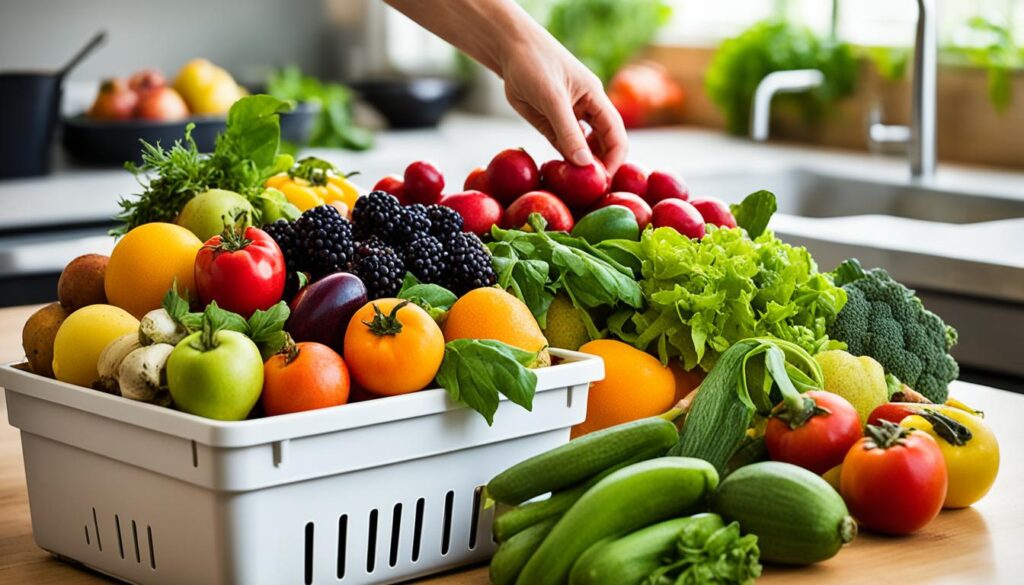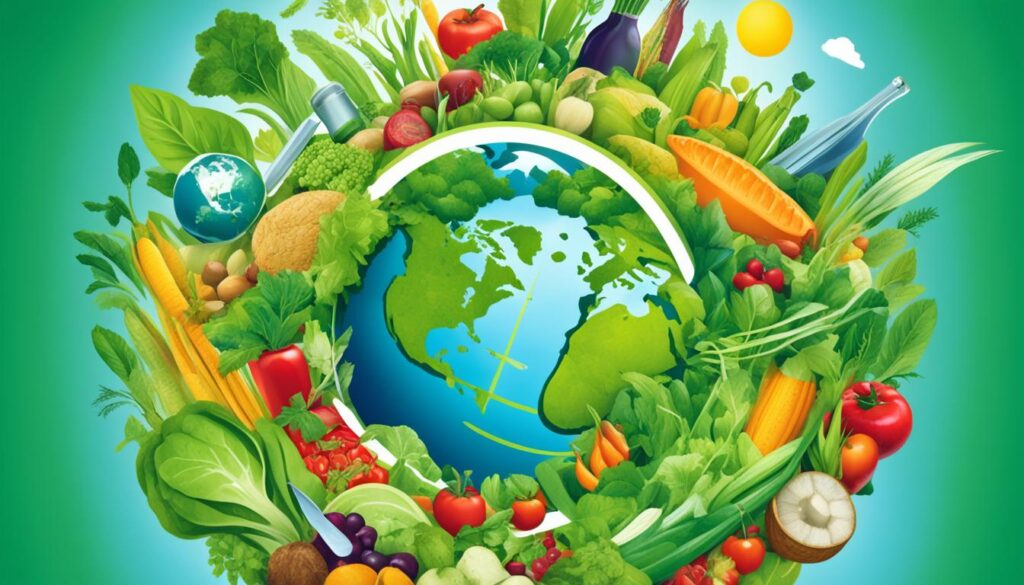Sustainable Food Choices Impact Your Health : When it comes to our health, the choices we make about what we eat play a significant role. Sustainable food choices, in particular, can have a profound impact on our well-being. By opting for foods that are produced using organic and eco-friendly practices, we not only support a healthier planet but also nourish our bodies with wholesome and nutrient-dense options.
Sustainable eating is all about making conscious decisions that prioritize both our health and the environment. It involves opting for organic foods, locally sourced products, and plant-based alternatives. These choices not only reduce our carbon footprint but also provide us with the essential nutrients our bodies need for optimal functioning.
Key Takeaways:
- Choosing sustainable food options can lead to healthier eating habits and provide more nutrients to support our overall well-being.
- Sustainable food choices prioritize foods that are produced using organic and eco-friendly practices.
- By making conscious decisions about what we eat, we contribute to a healthier planet for future generations.
- Sustainable eating involves opting for organic foods, locally sourced products, and plant-based alternatives.
- Sustainable food choices not only reduce our carbon footprint but also provide essential nutrients for optimal bodily function.
The Environmental Impact of Food Choices
Diets high in animal protein and certain crops can have a significant environmental impact. As our population grows and food production increases, it is crucial to consider the sustainability of our food choices. Sustainable food consumption involves making informed decisions that reduce the negative impact on the environment while maintaining proper nutrition.
One key aspect of sustainable eating practices is reducing water usage. Agriculture accounts for a substantial portion of global water consumption, and certain farming methods can lead to water scarcity. By choosing sustainable food options, we can support farming practices that prioritize water conservation and reduce the strain on water resources.
In addition to water usage, sustainable food choices also address the issue of soil depletion. Intensive agricultural practices, such as excessive pesticide use and monocropping, can deplete soil nutrients and degrade soil quality over time. By opting for sustainable options, such as organic and regenerative agriculture, we can promote healthier soil ecosystems and preserve the long-term fertility of the land.
Another major concern is greenhouse gas emissions. The production, transportation, and processing of food contribute to the release of greenhouse gases, which contribute to climate change. Livestock farming, in particular, is a significant source of methane, a potent greenhouse gas. Choosing sustainable food options that prioritize plant-based alternatives or more environmentally friendly animal farming methods can help reduce greenhouse gas emissions and mitigate the impact of climate change.
Sustainable food consumption is not just about protecting the environment; it also encompasses nutrition and sustainability. By selecting nutrient-rich foods that are grown sustainably, we can ensure that our diets are both healthy for our bodies and the planet. Sustainable food options often include a variety of fruits, vegetables, whole grains, and plant-based proteins, providing a well-rounded and nutritious diet.
Embracing sustainable food choices is essential to creating a healthier and more sustainable future. Through our individual decisions, we can contribute to a more sustainable food system, reduce our environmental impact, and support the long-term health of our planet.
The Health Consequences of Food Choices

When it comes to our health, the consequences of our food choices cannot be underestimated. Unhealthy diets laden with processed foods and additives can lead to various health issues, including obesity, diabetes, and heart disease. It’s imperative that we make conscious decisions about what we eat to ensure our well-being.
One way to improve our diet and mitigate the health risks associated with poor food choices is by adopting a sustainable approach. A sustainable diet focuses on consuming foods that are not only good for our bodies but also support the health of the planet. By opting for sustainable food options, we can reduce our reliance on processed foods and additives known to have adverse effects on our health.
Sustainable food choices promote a balanced and nourishing diet that provides our bodies with essential nutrients. These choices prioritize whole, unprocessed foods such as fruits, vegetables, whole grains, and plant-based proteins. These nutrient-dense options help support our overall well-being, strengthen our immune system, and reduce the risk of chronic diseases.
Sustainable diets also advocate for a reduction in the consumption of animal products and the incorporation of more plant-based alternatives. This shift not only benefits our health but also contributes to the overall sustainability of our food system. Plant-based foods require fewer resources to produce, have a lower carbon footprint, and reduce the pressure on natural ecosystems.
By making sustainable food choices, we can play a role in improving our health and the health of the planet. It’s important to prioritize organic, locally sourced, and seasonal foods whenever possible. Supporting local farmers and producers who practice sustainable farming methods further strengthens the positive impact of our choices.
In summary, our food choices have significant implications for our health. Opting for sustainable food options allows us to nourish our bodies while minimizing the negative health consequences associated with processed foods and additives. By embracing a sustainable diet, we can support our own well-being and contribute to a healthier, more sustainable food system for future generations.
The Connection Between Diet and Climate Change

Food production and agriculture play a significant role in contributing to greenhouse gas emissions. Livestock farming and certain agricultural practices release methane and other harmful pollutants into the atmosphere, contributing to climate change. Taking steps to make sustainable food choices can help reduce our carbon footprint and mitigate the negative impact on the environment.
According to the Food and Agriculture Organization of the United Nations, the food sector accounts for approximately one-quarter of global greenhouse gas emissions. This includes emissions from deforestation, land use changes, and the production and transport of food. By opting for environmentally sustainable food options, we can collectively make a difference in reducing these emissions and protecting our planet.
The Effect of Livestock Farming
Livestock farming, especially the production of beef and lamb, significantly contributes to greenhouse gas emissions. According to research conducted by the Food and Agriculture Organization, livestock production alone accounts for nearly 15% of global greenhouse gas emissions, primarily through methane release from cattle digestion and manure management.
Sustainable Agricultural Practices
Certain agricultural practices also contribute to greenhouse gas emissions, such as the excessive use of synthetic fertilizers, which release nitrous oxide, a potent greenhouse gas. Additionally, deforestation for agricultural purposes further exacerbates climate change by reducing the Earth’s capacity to absorb carbon dioxide.
Implementing sustainable agricultural practices, such as organic farming and agroforestry, can help reduce greenhouse gas emissions and promote a more environmentally friendly food system.
Evidence of the Impact
The impact of food production on climate change can be best understood through statistical data. The following table highlights the greenhouse gas emissions associated with various food production practices:
| Food Production Practice | Greenhouse Gas Emissions (kg CO2e per kg of product) |
|---|---|
| Lamb production | 39.2 |
| Beef production | 27.0 |
| Chicken production | 6.9 |
| Vegetable production | 2.0 |
This data clearly demonstrates the varying carbon footprints associated with different food production practices. By prioritizing plant-based options and reducing our consumption of high-emission foods, such as beef and lamb, we can make significant strides towards mitigating climate change.
Overall, the connection between our diet and climate change is undeniable. Making sustainable food choices is not only crucial for our health but also for the well-being of our planet. By reducing our reliance on high-emission food production and adopting environmentally sustainable practices, we can contribute to a healthier and more sustainable future.
Benefits of a Sustainable Diet

Eating a sustainable diet has numerous benefits for both our health and the environment. By choosing healthy diets from sustainable food sources, we can nourish our bodies while reducing our impact on the planet.
1. Balanced and Nutritious Intake:
A sustainable diet emphasizes a diverse range of foods, including fruits, vegetables, whole grains, and plant-based proteins. These nutrient-rich choices provide essential vitamins, minerals, and antioxidants that support overall health and well-being.
2. Reduced Risk of Chronic Diseases:
Diets from sustainable food systems have been linked to a lower risk of chronic diseases such as obesity, type 2 diabetes, and heart disease. Consuming less processed foods and added sugars and incorporating more natural, whole foods can improve our metabolic health and reduce the incidence of chronic conditions.
3. Increased Energy Levels:
By fueling our bodies with healthy, sustainable foods, we can experience increased energy levels throughout the day. Whole grains, fruits, and vegetables provide essential carbohydrates for sustained energy, while lean proteins and healthy fats contribute to satiety and proper hormone function.
4. Support for a Healthy Immune System:
A diet rich in fruits, vegetables, and other plant-based foods boosts our immune system’s ability to fight off infections and diseases. These foods contain a variety of vitamins, minerals, and antioxidants that strengthen our immune defenses and promote overall resilience.
5. Preservation of Biodiversity:
Sustainable diets prioritize consuming foods produced through eco-friendly practices that support biodiversity. By choosing locally sourced and organic options, we can protect ecosystems and promote the diversity of plant and animal species.
6. Promotion of Environmental Sustainability:
Diets from sustainable food systems play a crucial role in addressing the health and environmental impacts of food production. By minimizing our reliance on resource-intensive livestock farming and supporting sustainable agriculture, we help reduce greenhouse gas emissions, conserve water resources, and preserve soil health.
7. Development of Resilient Food Systems:
Adopting sustainable diets contributes to the development of resilient and equitable food systems. It supports local farmers, fosters community connections, and promotes fair trade practices. By embracing sustainable food choices, we contribute to a more just and sustainable food future for all.
By prioritizing healthy diets from sustainable food sources, we can positively impact both our own health and the environment. Let’s make conscious choices that benefit us and future generations by supporting sustainable food systems.
Tips for Making Sustainable Food Choices

When it comes to making sustainable food choices, there are several simple yet effective strategies that you can incorporate into your daily life. By following these tips, you can contribute to reducing food waste, promoting plant-based food options, and minimizing food loss and waste.
1. Reduce Food Waste
Food waste is a significant issue that contributes to environmental degradation. By taking proactive steps to reduce food waste, you can make a positive impact on sustainability. Consider the following practices:
- Plan your meals: Plan your meals in advance to ensure you purchase only what you need.
- Use leftovers creatively: Repurpose leftover ingredients to make delicious meals and minimize waste.
- Properly store food: Store perishable items correctly to maximize their shelf life and prevent spoilage.
2. Choose Plant-Based Options
Opting for plant-based food options is a powerful way to support sustainability. Plant-based diets have been linked to reduced environmental impact and improved health outcomes. Consider incorporating more fruits, vegetables, legumes, and whole grains into your meals to lower your reliance on meat and animal products.
3. Support Local and Organic Food Producers
Supporting local and organic food producers is essential for promoting sustainable farming practices. Local farmers often utilize environmentally friendly methods, such as organic farming, that prioritize soil health and biodiversity. By purchasing their products, you not only contribute to reducing food miles, but also support the local economy and foster a more sustainable food system.
By implementing these tips, you can make a significant difference in reducing food waste, promoting plant-based food options, and minimizing food loss and waste. Small changes in your everyday choices can have a big impact on creating a more sustainable future.
The journey towards sustainable food choices starts with individual actions and conscious decision-making. By incorporating these tips into your daily life, you can contribute to a healthier planet and a brighter future for generations to come.
Sustainable Food Practices and Best Practices

Sustainable food practices play a crucial role in promoting environmentally friendly and ethical food production. Implementing these practices is essential for ensuring the availability of nutritious and safe food while minimizing the negative impact on the planet. By reducing reliance on chemical fertilizers, adopting cover cropping techniques, and implementing agroforestry, sustainable farming methods contribute to improved soil health, water conservation, and biodiversity preservation.
The Benefits of Sustainable Food Practices
When farmers prioritize sustainable farming practices, it leads to a range of positive outcomes. These practices help improve soil quality and fertility, reducing the need for chemical fertilizers that can contaminate water sources. By incorporating cover crops into their fields during periods of non-production, farmers can protect the soil from erosion, enhance nutrient cycling, and suppress weeds naturally. Agroforestry, which involves growing trees alongside crops and livestock, promotes biodiversity, provides shade, and contributes to long-term sustainability.
“Sustainable food practices help improve soil health, conserve water resources, and promote biodiversity.”
The Role of Sustainable Food Production
Sustainable food production involves implementing practices that minimize negative environmental impact while ensuring food security and safety. By reducing the use of synthetic pesticides and fertilizers, sustainable farmers protect water quality and promote ecosystem health. These practices also prioritize the humane treatment of animals, eliminating the use of intensive confinement systems and promoting ethical animal husbandry practices.
The Importance of Sustainable Farming
Sustainable farming methods go beyond environmental benefits; they also contribute to social and economic sustainability. By adopting sustainable practices, farmers can diversify their income sources, reduce production costs, and improve long-term profitability. Additionally, sustainable farming supports local communities by providing employment opportunities and preserving traditional agricultural knowledge.
Here is a visual representation of the benefits of sustainable food practices:
| Environmental Benefits | Social Benefits | Economic Benefits | |
|---|---|---|---|
| Better soil health | Conserves water resources | Supports local communities | Diversifies income sources |
| Promotes biodiversity | Reduces greenhouse gas emissions | Promotes traditional farming knowledge | Reduces production costs |
| Minimizes chemical inputs | Enhances ecosystem health | Ensures ethical treatment of animals | Improves long-term profitability |
By adopting sustainable food practices and implementing best practices in food production, we can create a more resilient and sustainable food system for future generations.
The Role of Policy and Global Collaboration

Achieving a sustainable food system requires collaboration between governments, industries, and individuals. Policy changes, such as reducing food waste and improving food production practices, are necessary for creating a more sustainable future. The United Nations’ Sustainable Development Goals provide a framework for global action to ensure food security, promote sustainable agriculture, and protect the environment.
To reduce food waste, policies can be implemented at various levels. Governments can establish regulations and incentives to encourage businesses and consumers to minimize food waste throughout the supply chain. This includes measures such as setting targets for food waste reduction, implementing waste prevention strategies, and promoting the redistribution of surplus food to those in need.
Additionally, improving food production practices is vital for sustainable development. Governments can support and fund research and development in areas such as agroecology, organic farming, and precision agriculture. These innovative approaches can help reduce the environmental impact of food production, conserve natural resources, and promote biodiversity.
“Sustainable food systems require a unified effort from all stakeholders. Governments must provide the necessary policy frameworks and incentives, while industries and individuals need to adapt their practices and consumer behaviors.” – Dr. Emily Thompson, Sustainable Food Expert
Global collaboration is also crucial in addressing the challenges of food production and consumption. Governments, international organizations, and non-profit institutions can collaborate to share knowledge, best practices, and technologies. By working together, we can develop sustainable solutions and implement them on a larger scale, ensuring that no one is left behind.
Furthermore, the Sustainable Development Goals (SDGs) set by the United Nations serve as a blueprint for achieving a sustainable future. SDG 2 focuses on ending hunger, achieving food security, improving nutrition, and promoting sustainable agriculture. This goal emphasizes the importance of sustainable food production and consumption in achieving overall development objectives.
The SDGs provide a framework for policymakers, businesses, and individuals to align their efforts and work towards common objectives. By incorporating the SDGs into national and international policies, we can create synergies and maximize our impact in addressing food-related challenges.
| Key Actions for Policy and Global Collaboration | Benefits |
|---|---|
| Implementing policies to reduce food waste | – Minimizes the environmental impact of wasted resources – Addresses food insecurity and hunger – Reduces greenhouse gas emissions |
| Supporting research and development in sustainable agriculture | – Promotes eco-friendly farming practices – Improves soil health and biodiversity – Enhances food production efficiency |
| Advancing international collaboration and knowledge-sharing | – Accelerates the adoption of sustainable practices globally – Facilitates the exchange of expertise and technology – Strengthens global food security |
In conclusion, policy changes and global collaboration play a significant role in achieving a sustainable food system. By implementing measures to reduce food waste and improve food production practices, we can protect the environment, promote food security, and enhance overall sustainability. It is essential for governments, industries, and individuals to work together and align their efforts with the United Nations’ Sustainable Development Goals to create a brighter and more sustainable future for all.
Conclusion
Sustainable food choices have a profound impact on both our health and the environment. By making conscious decisions about what we eat, we can support our own well-being while preserving the planet for future generations. Adopting a sustainable diet not only benefits us individually but also contributes to the broader goal of creating a healthier and more sustainable world.
When we choose sustainable food options, we prioritize the health of both ourselves and the planet. By opting for organic and locally sourced foods, we reduce our exposure to harmful chemicals and support farming practices that protect the environment. Additionally, sustainable food choices provide us with more nutrients, resulting in healthier eating habits and improved overall well-being.
Furthermore, sustainable food choices play a vital role in environmental sustainability. By reducing our consumption of animal proteins and supporting plant-based options, we can decrease the negative impact of livestock farming and certain agricultural practices on greenhouse gas emissions and water usage. We have the power to make a difference through the choices we make every day, and by choosing sustainable foods, we contribute to the preservation of natural resources and the mitigation of climate change.
Also Refer : Healthy Low-Sodium Snacks For Heart Health
FAQs
Q: How do sustainable food choices impact your health?
A: Sustainable food choices can positively impact your health by providing nutritious and healthy options that support both human and planetary health. By choosing foods that are part of a healthy and sustainable diet, you can reduce your environmental footprint and promote better overall health.
Q: What is the relationship between food system and health and environmental impacts?
A: The food system plays a crucial role in determining both the health and environmental impacts of our diets. By understanding how food production and consumption affect public health and the environment, we can make informed dietary choices that benefit ourselves and the planet.
Q: How can diets rich in fruits and vegetables benefit your health?
A: Diets rich in fruits and vegetables are associated with numerous health benefits, including a reduced risk of chronic diseases and improved overall well-being. Incorporating a variety of colorful fruits and vegetables into your meals can provide essential nutrients for optimal health.
Q: What are some tips for maintaining a healthy and sustainable diet?
A: Some tips for maintaining a healthy and sustainable diet include choosing locally sourced foods, reducing food waste, and prioritizing whole, unprocessed foods. By focusing on the quality and sustainability of your food choices, you can support both your health and the environment.
Q: How does the global food system impact public health?
A: The global food system has significant implications for public health, influencing factors such as food supply, dietary choices, and nutrition-related health effects. Understanding the complexities of the food industry can help us make informed decisions about our diets and overall health.
Q: What is the Eat-Lancet Commission on Healthy Diets and how does it relate to planetary health?
A: The Eat-Lancet Commission on Healthy Diets is a scientific report that promotes a planetary health diet aimed at improving both human and environmental well-being. By following the dietary recommendations outlined in the report, individuals can contribute to a healthier future for both people and the planet.
Q: Why is it important to consider the environmental footprint of food choices?
A: Considering the environmental footprint of our food choices is vital for supporting sustainable practices that benefit human and planetary health. By opting for foods with a lower environmental impact, we can help mitigate the effects of climate change and promote a more environmentally conscious food system.













